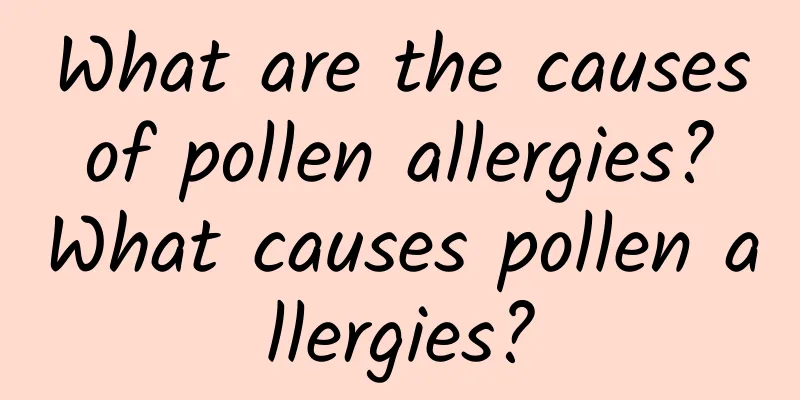What are the causes of pollen allergies? What causes pollen allergies?

|
When the oil and polysaccharide substances contained in pollen are inhaled, they will be digested by the secretions of the nasal cavity, and then more than ten kinds of antibodies will be released. If these antibodies meet the invading pollen and accumulate in large quantities, they will cause skin allergies. Especially during the season change from spring to autumn, it makes people very uncomfortable, so it is better to understand in advance what are the pollen allergens? Help friends to avoid them as much as possible in advance. Contents of this article 1. What are the pollen allergens? 2. What causes pollen allergy? 3. What to do if you are allergic to pollen 1What are the causes of pollen allergies?In northern my country, the tree pollens that are most likely to cause allergies in spring mainly come from cypress, birch, sycamore, ash and ailanthus. With the arrival of spring, many trees need to rely on the wind to spread a large amount of pollen (male reproductive cells) for pollination. These wind-borne pollens are spread through the air and are inevitably inhaled by us. Normal people do not feel anything when they inhale wind-borne pollens, but for patients with allergic constitutions, they will produce a strong and excessive immune response. For example, pollen adheres to the respiratory mucosa and conjunctiva of the eyes, causing mild or severe inflammatory reactions, and then allergic symptoms appear. Therefore, in spring, many patients will continue to have symptoms of sneezing, runny nose, coughing or asthma, and are prone to allergic rashes on the face, eyelid edema, and even food allergies from plants. If these symptoms occur periodically every spring, it indicates that there are regional allergens in this season, and an important part of them is wind-borne pollen. In addition, the willow catkins that can be seen everywhere in the northern region in this season are also considered to be allergens, but in fact they may not be. There have been media reports before that willow catkins are not allergens themselves, but are just a "blame" for wind-borne pollen, which is more allergenic. Because when the catkins are flying all over the sky, it is the time when trees such as sycamores are blooming, and the overlap of the two times leads to people's misjudgment. 2What causes pollen allergy?There are two types of cells in the human body, namely mast cells and basophils, which are widely distributed in the nasal mucosa, gastrointestinal mucosa, and around the microvessels in the connective tissue under the skin and in the capsule of the internal organs. These two types of cells contain allergic mediators such as histamine, leukotrienes, 5-hydroxytryptamine, and tannin. Under the stimulation of environmental factors such as chemicals, air pollution, and sunlight radiation, a large number of free radicals will be produced in the body. If the free radicals are not removed in time after oxidation, they will damage the cell membranes of mast cells and basophils, causing cell membrane denaturation and cell instability. When unstable cells encounter allergens, antigens and antibodies react specifically, causing the cell membrane to detach and release allergic mediators. Allergic mediators can cause smooth muscle contraction, capillary dilation, increased permeability, mucus secretion and tissue damage, thereby triggering the occurrence of allergic reactions. In the process of allergic reactions, allergic mediators play a direct role. Allergens are the external cause of allergic symptoms, while the body's low immune ability and the oxidative damage of mast cells and basophils by a large number of free radicals are the internal causes of allergies. In addition, according to the theory of traditional Chinese medicine and the latest research results, allergies are mainly caused by wind, dampness, heat, and evil in the blood and skin, or by blood heat and external wind. That is, it is closely related to the presence of certain toxins in the human blood. When the oil and polysaccharide contained in pollen are inhaled, they will be digested by the secretions of the nasal cavity, and then more than ten kinds of antibodies will be released. If these antibodies meet the invading pollen and accumulate in large quantities, they will cause skin allergies. Experts have shown that there are two main reasons for this: on the one hand, due to the improvement of people's living standards, they have taken in a lot of high-protein, high-calorie foods such as eggs and meat products, which has led to an increase in the body's ability to produce antibodies, making it easier to have allergic reactions when encountering antigens such as pollen. On the other hand, due to air pollution, water pollution and the extensive use of food additives, the human body is exposed to more antigenic substances, which has led to allergic diseases in humans. 3What to do if you are allergic to pollenHow to prevent or treat pollen allergy? Patients with allergic symptoms in spring should go to a hospital with an allergy department, or a respiratory department or an ENT department with an allergy professional group. The main purpose is to identify the allergens. "If it is indeed a pollen allergy, you can take corresponding preventive measures according to the different pollen dispersion times. For example, wear anti-pollen glasses or masks outdoors, wash your hair and clothes in time after returning home to remove the pollen; if you go out and take public transportation, close the doors and windows to prevent sneezing, itchy eyes and affected vision caused by inhaling pollen, which may lead to accidents such as loss of control of the driver." Given that there are a lot of birch and cypress trees in the north, northern patients who are allergic to pollen can, if conditions permit, travel to the south on business trips or move to another city during the corresponding season. Their symptoms may be significantly alleviated or disappear. If the above methods are not effective, you should use corresponding anti-allergic drugs under the guidance of a doctor to control the symptoms. Antihistamines should be used to symptomatically treat allergic rhinitis and conjunctivitis. For patients with more severe symptoms, glucocorticoid nasal sprays can be used to treat allergic rhinitis. "If the doctor assesses that the patient's allergic condition is in a rapidly developing stage, he or she may develop asthma or even be combined with certain plant-derived food allergies." For such patients, it is recommended to undergo allergen-specific immunotherapy, also known as desensitization therapy - gradually injecting allergens into the patient's body from small amounts to large amounts, allowing the body to re-recognize the allergens, thereby achieving a radical cure for allergen tolerance. |
<<: Is English the official language in Singapore? How to apply for a visa to Singapore
>>: How to choose amaranth? Can the amaranth stems be eaten?
Recommend
What is the broad ligament of the uterus
The broad ligament of the uterus is a type of ute...
Wearing a hat can protect your heart? The truth is...
Myth "Wearing a hat can protect your heart!&...
Can I still get pregnant if I take birth control pills during ovulation?
There are many contraceptive methods in life, but...
People with these personalities, please pay attention, you are more likely to suffer from depression
We don’t know how many people die from depression...
Doctors recommend that children undergo "mydriasis eye examination" and parents do not need to worry or resist
When going to an ophthalmology department or opto...
Why do pregnant women have itchy feet?
As the pregnancy time of pregnant women increases...
Is it good for pregnant women to eat sunflower oil?
After a woman becomes pregnant, her body undergoe...
What changes occur in the uterus before menstruation?
We all know that women's menstruation flows o...
When is the best time to drink yogurt? The nutritional value, efficacy and function of yogurt
Yogurt is made from fresh milk, sterilized, then ...
Heterogeneous echogenicity of the endometrium
Endometrial thickening is a relatively common dis...
How does hysterectomy affect your sex life?
Hysterectomy is one of the most common gynecologi...
It hurts when you press below a woman's belly button
Abdominal pain is very common in daily life, and ...
What is the solar term after the winter solstice? Will it get colder after the winter solstice?
Ancient people said: When the yin reaches its ext...
Why is knife fish so expensive? Is knife fish the same as hairtail fish?
As we all know, there are many kinds of fish. Dif...
What should I do if I have repeated fever during confinement?
During the confinement period, if a new mother ha...









